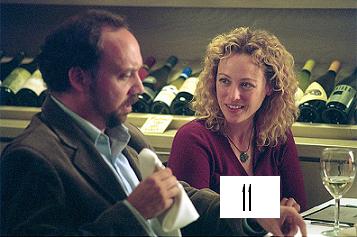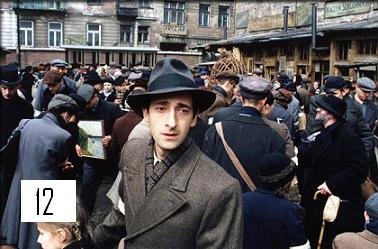 "The world doesn't give a shit about what I have to say... I'm so insignificant, I can't even kill myself." - Miles Raymond. In Sideways, this line does not appear until more than halfway through the film, but Paul Giamatti is so good at relaying the degree of his character's misery and self-hatred that the audience has already guessed as much. To put it lightly, Miles is a "sad" man, in every sense of the word. Wasting away his life teaching literature to clueless eighth-graders, he has few pleasures or hobbies to keep himself busy: wine-tasting and writing his mammoth semi-confessional novel. And yet, Miles still cannot look towards the future because he is always looking over his shoulder at what should have been. In a wordless scene, Giamatti stands in his mother's room (just having stole cash from her drawer) and looks longingly at pictures of himself as a teenager and of his ex-wife. His shoulders slump forward and his head droops, his eyes dark pools of regret and loneliness - it's an acting moment that encapsulates the entire performance perfectly. And when the past is too painful to confront, Miles turns to wine for a high, which almost constantly gets him into trouble. Watch carefully how Giamatti instinctively reaches for the bottle the moment things start to spiral out of control. The biggest blunder he commits is calling his ex-wife while on a double-date (!) and offers his regards on her recent re-marriage. This destructive behavior is most baffling to his best friend Jack (played with impeccable comic timing by Thomas Haden Church), who cannot understand why Miles is so intent on ruining so many good opportunities with his ever-foul mood and bad-sport mentality (see Giamatti's best line reading: "No, if anyone orders Merlot, I'm leaving. I am not drinking any fucking Merlot!".)
"The world doesn't give a shit about what I have to say... I'm so insignificant, I can't even kill myself." - Miles Raymond. In Sideways, this line does not appear until more than halfway through the film, but Paul Giamatti is so good at relaying the degree of his character's misery and self-hatred that the audience has already guessed as much. To put it lightly, Miles is a "sad" man, in every sense of the word. Wasting away his life teaching literature to clueless eighth-graders, he has few pleasures or hobbies to keep himself busy: wine-tasting and writing his mammoth semi-confessional novel. And yet, Miles still cannot look towards the future because he is always looking over his shoulder at what should have been. In a wordless scene, Giamatti stands in his mother's room (just having stole cash from her drawer) and looks longingly at pictures of himself as a teenager and of his ex-wife. His shoulders slump forward and his head droops, his eyes dark pools of regret and loneliness - it's an acting moment that encapsulates the entire performance perfectly. And when the past is too painful to confront, Miles turns to wine for a high, which almost constantly gets him into trouble. Watch carefully how Giamatti instinctively reaches for the bottle the moment things start to spiral out of control. The biggest blunder he commits is calling his ex-wife while on a double-date (!) and offers his regards on her recent re-marriage. This destructive behavior is most baffling to his best friend Jack (played with impeccable comic timing by Thomas Haden Church), who cannot understand why Miles is so intent on ruining so many good opportunities with his ever-foul mood and bad-sport mentality (see Giamatti's best line reading: "No, if anyone orders Merlot, I'm leaving. I am not drinking any fucking Merlot!".)However, when Miles chooses to open himself up to others, there is a shred of hope for him and the direction his life will take. This comes in the form of Maya (the dazzling Virginia Madsen), who is able to see Miles for the sensitive, deeply wounded soul that he is. In the most-talked about moment of the entire film, the two oenophiles share their experiences of wine: their intimate secrets and thoughts about the beauty of its production and the quality of its flavor. Giamatti is a pleasure to watch here, as his eyes glow in awe of this articulate, sexy woman, his cynicism melting away like a lone ice cube in the warm sunlight. Watch how he intially rejects her advances, berates himself later in the washroom... and then returns to softly embrace and kiss her in the kitchen. What tender, gorgeously-written (and acted) foreplay this is! The viewer is seduced along in the wordplay, by both these wonderfully human characters who have faults and shortcomings like everyone else. What a relief it is, then, to find in the end that despite a falling-out, these two will have a chance at making it together. Because imagining Miles sinking deeper into his depression (read: resorting to sneaking wine into a fast-food joint) and growing old alone would have been just too horrible to consider.
 This is my last featured actor to have won an Academy Award for his performance, and what a marvelous victory it was that year (for all of us really.) The legendary smooch, the overwhelmed response, the stubborn refusal to stay within speech time constraints... I remember how I choked back on my pizza, jumped up and started shouting at my mother in the next room (Her response: "Mmhmm; Adrien who?".) I rejoiced not only for him, but the fact that a solemn, introverted turn like this beat out showy and grand work that voters usually like so much (read: the also magnificent Daniel Day-Lewis in Gangs of New York, who was largely expected to take home the trophy.) But this is a difficult performance to watch or even revisit (let alone the film itself). When The Pianist begins, Brody introduces the audience to Wladyslaw Szpilman as a young, foreign-educated pianist who foresees so much opportunity in store for himself (his occupation: an acclaimed performer on the radio.) But once Poland is invaded by Germany, he sees his dreams rapidly disintegrate; not long after, he finds himself entertaining "parasite" patrons of a ghetto restaurant (much to the disdain of his embittered brother Henryk.) But the true nightmare lies ahead as Szpilman is separated from his family, left to to wander the wasteland of an exorcised, forgotten community. As Szpilman becomes further isolated from the world as a fugitive of the Third Reich, he recedes more and more into himself.
This is my last featured actor to have won an Academy Award for his performance, and what a marvelous victory it was that year (for all of us really.) The legendary smooch, the overwhelmed response, the stubborn refusal to stay within speech time constraints... I remember how I choked back on my pizza, jumped up and started shouting at my mother in the next room (Her response: "Mmhmm; Adrien who?".) I rejoiced not only for him, but the fact that a solemn, introverted turn like this beat out showy and grand work that voters usually like so much (read: the also magnificent Daniel Day-Lewis in Gangs of New York, who was largely expected to take home the trophy.) But this is a difficult performance to watch or even revisit (let alone the film itself). When The Pianist begins, Brody introduces the audience to Wladyslaw Szpilman as a young, foreign-educated pianist who foresees so much opportunity in store for himself (his occupation: an acclaimed performer on the radio.) But once Poland is invaded by Germany, he sees his dreams rapidly disintegrate; not long after, he finds himself entertaining "parasite" patrons of a ghetto restaurant (much to the disdain of his embittered brother Henryk.) But the true nightmare lies ahead as Szpilman is separated from his family, left to to wander the wasteland of an exorcised, forgotten community. As Szpilman becomes further isolated from the world as a fugitive of the Third Reich, he recedes more and more into himself.Moving from building to building in the abandoned Warsaw Ghetto, Brody begins to resemble an empty shell of a human being. He experiences minimal human contact, and his life transforms into a quest to survive and live just one more day without being discovered. And yet what Brody imparts so beautifully is how the love of music quite literally saves Szpilman's life. It is in front of a piano, as his fingers dart back and forth across the keys, that he is at his happiest. The experience is wholly spiritual. His face lifts, his eyes close - he is himself again. A human being of value and love. Conversely, when he is denied creating his art (simply because the sound of the music will give him away), he gradually moves towards death. One of Brody's best moments in this entire film is the climax, where he weakly insists "Don't shoot! I'm Polish. I beg of you..." despite being constantly fired at by Soviet soldiers (who mistake him for a German.) He is so haggard, exhausted, that he can barely identify himself; the scene really shows how far Brody went (emotionally as well as physically) to access this character's plight. It's a frightening thing to consider.
Notes for Fun:
Speaking of the golden guy so often in this entry, I thought I'd offer some random trivia about my upcoming top ten of actors and how they fared with Oscar and other guilds overall (Am I giving away too many clues?):
- Only two actors on my list were nominated for Academy Awards for their performances; neither won.
- Only one of the actors was nominated for a Golden Globe (and did not win either.) Interestingly, this person was not acknowledged by Oscar, while the two aforementioned actors were not recognized by the HFPA. Weird, huh?
- Two actors portray real-life individuals (although not necessarily within biopics.)
- Two SAG nominations (one individual and ensemble.)
- Zero National Board of Review citations.
- I have performances from 2000, 2001, 2002, and 2004, but for some reason none from 2003 (at least going by imdb release dates.)
- Only two or three (depending on your view) of these can be considered "supporting" roles; the other actors are clearly the leads of their films.
5 comments:
Brilliant commentary. Brody would definitely make my Top 15, probably Top 10, of the decade. And "The Pianist" is just masterful stuff.
Hmm... very interesting "clues", though they don't really give much away! 2 Oscar noms, 1 Globe nod? Jesus ;)
My doomed-to-be-pathetic predictions will make an appearance shortly (I'm expecting to perform badly, to be honest... but am extremely excited about your actual picks!)
I had the same reaction when Brody won (and then again several minutes later when Polanski also won)--for once the Academy got it right.
You wonderfully articulated Giamatti's pitch-perfect despondency. Bravo. His perpetual puppy-dog expression helped, also.
(Oh, and I'm glad you enjoyed Almodovar's Women...Breakdown)
I'm hoping Tom Wilkinson, Mark Ruffalo, Chris Cooper or Christian Bale nab the number one spot. But all your choices have been so crazy (but great!:)) lately so I'm not sure that they're gonna make it.
Good morning!
I saw your post about the Toronto International Film Festival. Did you decide to 'waste' your ticket to An evening with Michael Moore? If not would you be interested in selling it?
Post a Comment